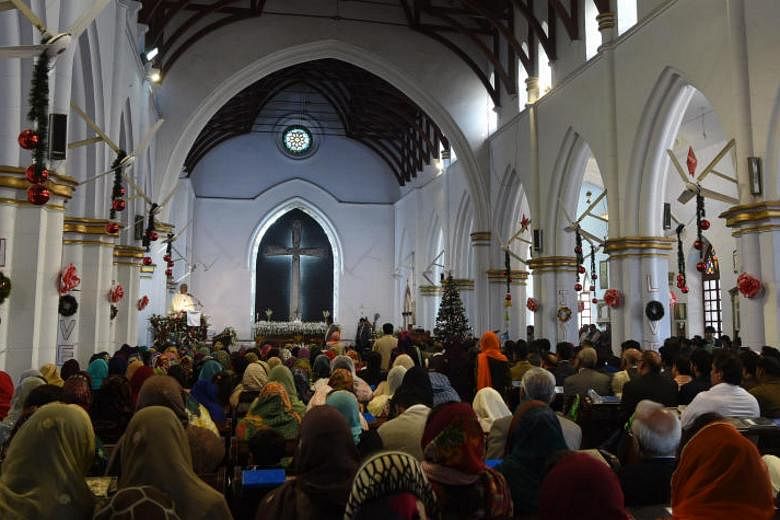ISLAMABAD - There were Christmas lights and trees, but also men in khaki with rifles in their arms.
Across Pakistan, a Muslim majority country of 220 million people, Christians celebrated Christmas on Monday (Dec 25) with zeal and zest despite threats of terrorism.
The Pakistani government deployed commandos, snipers and plainclothes policemen across the country to keep terrorists at bay, as the country's Christians celebrated the birth of Jesus Christ.
In cities from capital Islamabad to Lahore, Peshawar, Karachi and Quetta, huge numbers of worshippers dressed in festive outfits poured into heavily guarded churches decorated with Christmas lights and trees for prayer sessions.
The security measures come after a suicide gun attack on Dec 17 at the Bethel Memorial Methodist Church in Quetta during a Sunday service. Nine Christians were killed, with dozens wounded.
In a pleasant surprise for the local Christian community, Chief of Army Staff, General Qamar Javed Bajwa, took part in Christmas celebrations at Christ Church in the heart of garrison city Rawalpindi. In Pakistan, it is rare for the chief of the armed forces to attend any religious gathering.
General Qamar Bajwa acknowledged the contribution of Christians not only to the creation of Pakistan but also to its progress, in a press note issued by the Pakistan army on Monday.
The country's top leaders, President Mamnoon Hussain and Prime Minister Shahid Khaqan Abbasi, also sent well wishes to the Christian community for Christmas.
Such gestures have brought some cheer to Christians in Pakistan, who make up less than 2 per cent of its population. They have long faced discrimination, often ending up doing low-paying jobs, and sometimes becoming the target of trumped-up blasphemy charges.
Pakistan used to enjoy relative religious harmony. But this worsened as a result of religious clashes in 1974 between the Brelvi Sunnis and Ahmedi/Qadiani communities, the war in Afghanistan in 1979 and the military regime of General Zia ul Haq from 1978 to 1988, under which Christians were discriminated against.
Attacks against communities of religious minorities such as the Christians are not uncommon.
In recent years, the Christian community has also become a prime target of Islamist militants.
For instance, on Sept 22, 2013, a twin suicide bomb attack at All Saints Church in Peshawar killed 127 Christians; on March 15, 2015, 15 Christians were killed in twin blasts at Saint John Catholic Church and Christ Church in Lahore; and on March 27, 2016, a suicide bombing in a park killed more than 70 people, including many children, in Lahore on Easter Sunday.
But Mr Aamir Ghauri, editor of Pakistan's influential daily, The News, said the situation is changing for the better.
He told The Straits Times: "(The) government has shown signs of courage in confronting the rightist forces and military commanders have openly participated in Christmas celebrations by visiting churches and sharing in their festivities. These are hopeful signs."
In another move appreciated by Christians and non-Christians in Pakistan, the crew of the country's national carrier, Pakistan International Airline, gave out gifts to passengers on board. One of them even dressed up as Santa Claus. A video of the celebrations posted on the airline's Facebook page proved popular and was widely shared.

